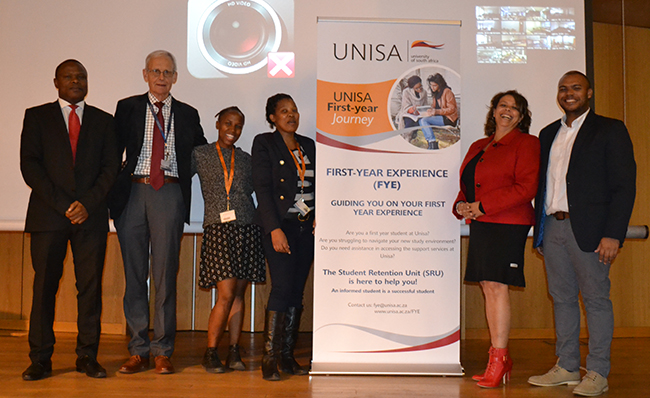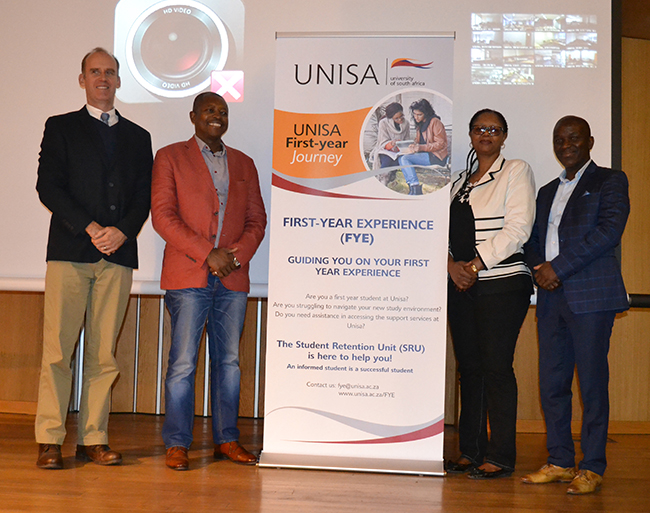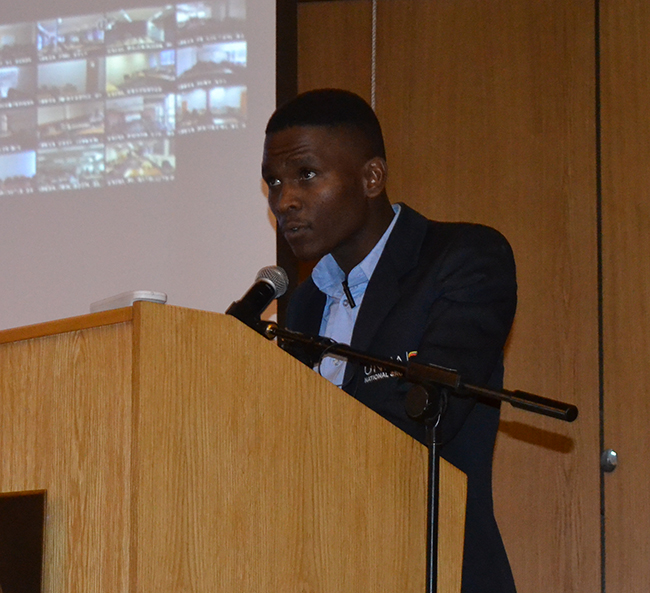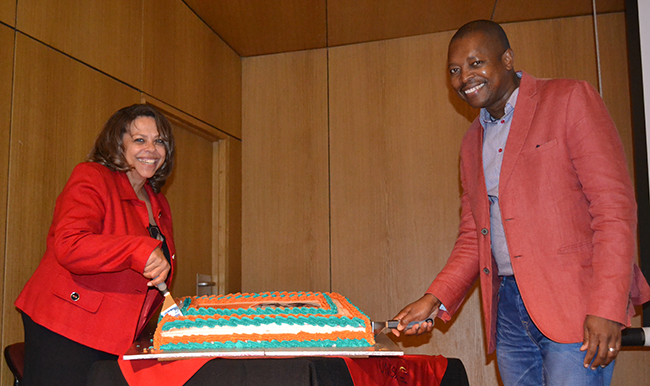News & Events
New course set to enhance first-year student experience
The Unisa Student Retention Unit (SRU) recently launched its First-Year Experience (FYE) Massive Open Online Course (MOOC). The course seeks to enhance readiness for open, distance and e-learning (ODeL) among students entering Unisa for the first time.
‘Successful transitions to a university environment can be challenging to students and also to universities in terms of how they (universities) manage the transition and offer quality tuition experiences to students,’ said Dr Rochelle Wessels, Manager: SRU, speaking at the launch. ‘Taking cognisance of our unique Unisa student profile, the FYE MOOC aims to provide extended support for students entering ODeL for the first time for the duration of their first year at Unisa. We also support collaboration efforts between Unisa departments and directorates to ensure effective service delivery within the programme as well as consistent monitoring and evaluation throughout the programme’s duration.’

The SRU team (from left): Dr Mzikayise Binza – Student Success Practitioner, Prof. Jacobus Pauw – Student Success Practitioner, Zuzeka Prudence Mkra - Student Success Practitioner, Vuyokazi Maliwa-Skosana - Student Success Practitioner, Dr Rochelle Wessels – Manager: Student Retention Unit, Kyle Bester - Student Success Practitioner
Wessels further explained that the MOOC seeks to develop key skills that are identified as critical for a successful transition into Unisa as an ODeL university. ‘Thus, the FYE MOOC serves to prepare, orientate and familiarise students with the Unisa environment,’ she said.
Holistic approach
Dr Andrew Van Zyl, Director: Academic Development Centre at the University of Johannesburg (UJ), stressed that improvement in rates of student success requires an intentional structured and proactive action. ‘This action is systematic in nature and coordinated in application,’ he said. ‘The system has not yet come to terms with the learning needs of the majority of the student body. FYE needs to be an effort at assisting students to effectively transition into university life, it should be intentional. The UJ FYE is a holistic initiative which encompasses all aspects of first year student experience in the context of an invitational and equitable institution. It comprises both curricular and extra-curricular initiatives, and is far more than a single event, programme or course. It attempts to establish an ethos and a way of life, through which all first year students will experience the transition into university life,’ said Van Zyl.
Van Zyl advised principles for facilitating an epistemological access through an FYE initiative include knowing one’s students, knowing one’s institution and context, meeting one’s students where they are and changing the core and the surface (becoming intentionally inviting of success.

Speakers (from left): Dr Andre Van Zyl – Director: Academic Development Centre, University of Johannesburg, Dr Sibusiso Chalufu – Acting Executive Director: Student Affairs and Regional Services, Unisa, Prof. Matshepo Matoane – Director: Instructional Support and Services, Unisa, Shiba Diketane – Deputy Director: University Capacity Development, Department of Higher Education and Training (DHET)
Closing the inequality gap
Representing the department of Higher Education and Training at the launch was Shiba Diketane, Deputy Director: University Capacity Development (UCDP). ‘The university system is successful overall in terms of access, success and ability to generate more research,’ he said. ‘The picture becomes more worrying when the following question is asked: What is the system’s contribution towards closing South Africa’s widening inequality gap? The drop-out and throughput rates still reflect apartheid patterns in terms of race. The UCDP underpins the department’s urgent response to these key transformation challenges for academic success. The UCDP therefore seeks to promote a structured approach to improving student success. The Department of Higher Education and Training is committed to support programmes such as this one that Unisa is launching today. In fact, FYE initiatives constitute more that 25% of student support programmes through the UCDP.’

NSRC Postgraduate Officer Lucas Mamabolo
Lucas Mamabolo, Postgraduate Office of Unisa’s National Student Representative Council (NSRC), said that the NSRC appreciates and is grateful for the SRU team’s willingness and commitment to facilitate necessary support for students at risk academically. ‘We had several meetings with the team to take us through some of their programmes, including the MOOC,’ he said. ‘Since Unisa also attracts learners straight from matric, most who are from areas which were and are still disadvantaged, this programme is useful for students who would otherwise find it difficult to transit into such an environment.’
Mamabolo emphasised that the success of Unisa’s students is at the centre of this project. It helps bridge the gap between lecturers and students,’ he said. ‘It also contributes to student-centeredness as one of the guiding values of this institution. Within their spaces, students must be able to acclimatise to the learning environment without experiencing technical difficulties that come with the teaching and learning methods. The academic environment needs to be conducive and enabling to their success.’

Celebrating a successful launch are Dr Rochelle Wessels and Dr Sibusiso Chalufu
At the conclusion of the launch Wessels was joined by Dr Sibusiso Chalufu, Acting Executive Director: Student Affairs and Regional Services, in cutting a celebratory cake.
* By Tshimangadzo Mphaphuli – Senior Journalist, Communications Directorate, Department of Institutional Advancement
Publish date: 2019/06/13
